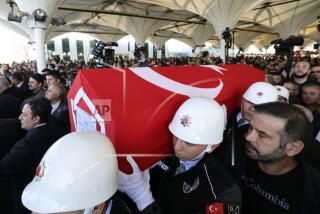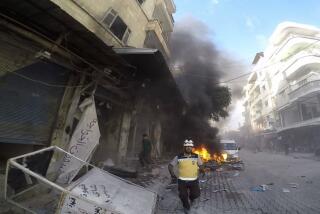2 Blasts Kill 56 at N. Iraq Celebrations
- Share via
IRBIL, Iraq — A pair of suicide bombers infiltrated holiday celebrations at the northern Iraq offices of the nation’s two main Kurdish political parties and blew themselves up Sunday, killing at least 56 people and injuring hundreds in nearly simultaneous strikes.
The attacks here in Irbil, 200 miles north of Baghdad, killed several top members of the Kurdistan Democratic Party and the Patriotic Union of Kurdistan. The bombings stunned the parties’ leaders, who have been staunch U.S. allies since the early 1990s and strongly supported the invasion to oust Saddam Hussein.
The blasts made Sunday the deadliest day in Iraq since Aug. 29, when a car bomb in the southern city of Najaf killed more than 100 people, including a revered ayatollah. Although vehicle bombs have become grimly familiar weapons in Iraq, Sunday’s attacks marked the first time that assailants have wired explosives to their bodies and detonated their payloads -- a technique employed by Palestinian and Sri Lankan extremists.
“Our enemies are not only against the Kurds, they are against humanity,” a grieving Kosrat Rosul Ali of the PUK said. “On this holy day they conduct such an attack?”
Sunday was the first day of Eid al-Adha, or Feast of Sacrifice, a Muslim holiday marking the biblical Abraham’s willingness to sacrifice his son. Party leaders had gathered to receive visits from loyalists, and although Kurdish leaders said they had been bracing for attacks, there were no security checks at the gate or the doors to either party’s headquarters. Body searches would have been impolite, officials explained later.
“We didn’t want to disturb or annoy people,” said Kamaran Bakir, a security officer who was on duty at the PUK’s offices. “Everyone was allowed to go inside.”
U.S. and Iraqi officials in Baghdad promptly denounced the violence as an effort to undermine Iraq’s return to self-rule, scheduled for June 30.
“Those responsible for today’s attacks are seeking to halt Iraq’s progress on the path to sovereignty and democracy,” said L. Paul Bremer III, the U.S. administrator in Iraq.
Deputy Defense Secretary Paul D. Wolfowitz, who is visiting Iraq, said the attackers “are about their own fanatical view of the world and they will kill to try to advance it. But we are winning, and they are losing.”
The bombings occurred as a United Nations team was preparing to come to Iraq to assess the feasibility of holding direct elections for an interim Iraqi government. The continuing lack of security has been cited as a major obstacle to a vote, and the Irbil bombings came just a day after at least 17 people died in other attacks, including a car bombing in Mosul that killed nine, a mortar strike in Baghdad that killed five and an attack on a U.S. convoy that took the lives of three soldiers.
In other violence Sunday, a rocket attack on a U.S. base near Balad, north of Baghdad, killed one soldier and wounded 12, the military said. Another soldier was reported killed Sunday when a Humvee overturned near the town of Haditha.
Hours after the blasts in Irbil, blood had collected in puddles on the floor of the PUK building, but the signs of a party were still visible. Plastic flowers were trampled on the ground, and sofas and speakers were tossed about. Festive streamers still hung in the courtyard’s trees, bare of leaves, and a green banner strung over the gate read, “We welcome our respected guests.”
As with almost all large-scale bombings in Iraq since the U.S.-led occupation began, there was no claim of responsibility. But suspicion immediately fell on Ansar al Islam, a radical group that has operated in northern Iraq and has been linked by U.S. officials to Al Qaeda.
Although the group was routed last spring by U.S. and Kurdish forces as the invasion of Iraq began, some Ansar members are believed to have filtered back into the Irbil region, one Kurdish official said.
“It was an attack by terrorists, Al Qaeda and Ansar al Islam,” said Iraqi Foreign Minister Hoshyar Zebari, a KDP member. But U.S. military officials said they had no immediate evidence linking Ansar to the bombings.
Although Ansar has an obvious revenge motive for striking at the Kurds, party members said other groups harbor enmity as well, including Sunni Muslim Arabs and foreign Arab fighters who revile the Kurds’ good relations with the U.S.-led coalition.
An emerging rapprochement between the PUK and the KDP -- longtime rivals who control separate parts of northern Iraq -- may also have provoked the Kurds’ foes.
“Now we are approaching real, genuine reconciliation and peace, and our enemies are against those gains,” said Jawdat Nori, a PUK member. “They hit both buildings, which means they’re hitting all of us. So now the Kurdish people have to act with one hand and unify their ranks.”
Many Kurds vowed the attacks would draw the rival parties closer. “Now we are faced with one enemy,” Ali of the PUK said.
The Kurds -- who enjoyed autonomy in northern Iraq from the early 1990s under the protection of a U.S.-and-British-patrolled “no fly” zone that kept Hussein’s forces at bay -- are now pressing to retain substantial independence within the new Iraq, a volatile issue.
Kurds are also pushing to gain political control of the oil-producing region around Kirkuk, where Arab and Turkmen residents resent what they view as a Kurdish power grab and have vowed to resist it.
Sunday’s blasts killed many prominent local officials of the Kurdish parties, including the governor of Irbil and the deputy prime minister of the KDP-controlled part of northern Iraq.
Political leanings among the Kurds are traditionally handed down from father to son, and many men had brought their boys to the morning gatherings.
“I came to say happy Eid to my friends,” Baqtiar Hasan said as he limped from KDP headquarters after the blast, his pants and shirt smeared with blood. “But it seems we must sacrifice for Iraq’s freedom. First we got rid of a bloody regime, and now we must sacrifice still more blood.”
Roshdi Hasan Mohammed, a 63-year-old elementary school teacher, was sitting in a plastic chair watching the crowds noisily mill through the PUK event when the building quaked.
The last thing he remembered was watching a man present a bouquet of flowers to a local official. Then came a roar and a blast.
The next thing Hasan knew, he had been thrown across the room and was lying on the floor. There was pandemonium all around him. People were scrambling for the door, trampling one another. Bodies and body parts were strewn about. “A horrible scene,” he said later, shuddering.
When his son heard what happened, he dashed to the headquarters. Terrified his father might be dead, he hunted through corpses. “I saw dead children,” Ari Roshdi said, his eyes brimming as he stood at his father’s side in a hospital.
Meanwhile, at the KDP office, Tahsin Jawhar Najim was enjoying the party before the bomb hit. For nearly a decade, he had worked as a tea servant for Saed Abdullah, a KDP official.
“People were cheerful, very happy and excited,” he said later. “There was a big crowd, and everyone giving congratulations.”
He was sitting behind his boss when the bomb resounded and the roof collapsed on top of them. “It got dark, I saw nothing,” he said. “I felt that there was a big panic.”
His boss was killed. As for Jawhar, he’s in danger of losing an eye.
“When you lose your eye, you lose everything,” he said from his hospital bed, with his blanket tugged to his chin. “This is the most beloved part of the body.”
Hours after the bombings, a group of party officials marched through the dim rooms of the shattered PUK headquarters. Then they announced that they had opened an investigation.
Times staff writers Patrick J. McDonnell in Baghdad and Jeffrey Fleishman in Berlin contributed to this report.
More to Read
Sign up for Essential California
The most important California stories and recommendations in your inbox every morning.
You may occasionally receive promotional content from the Los Angeles Times.












